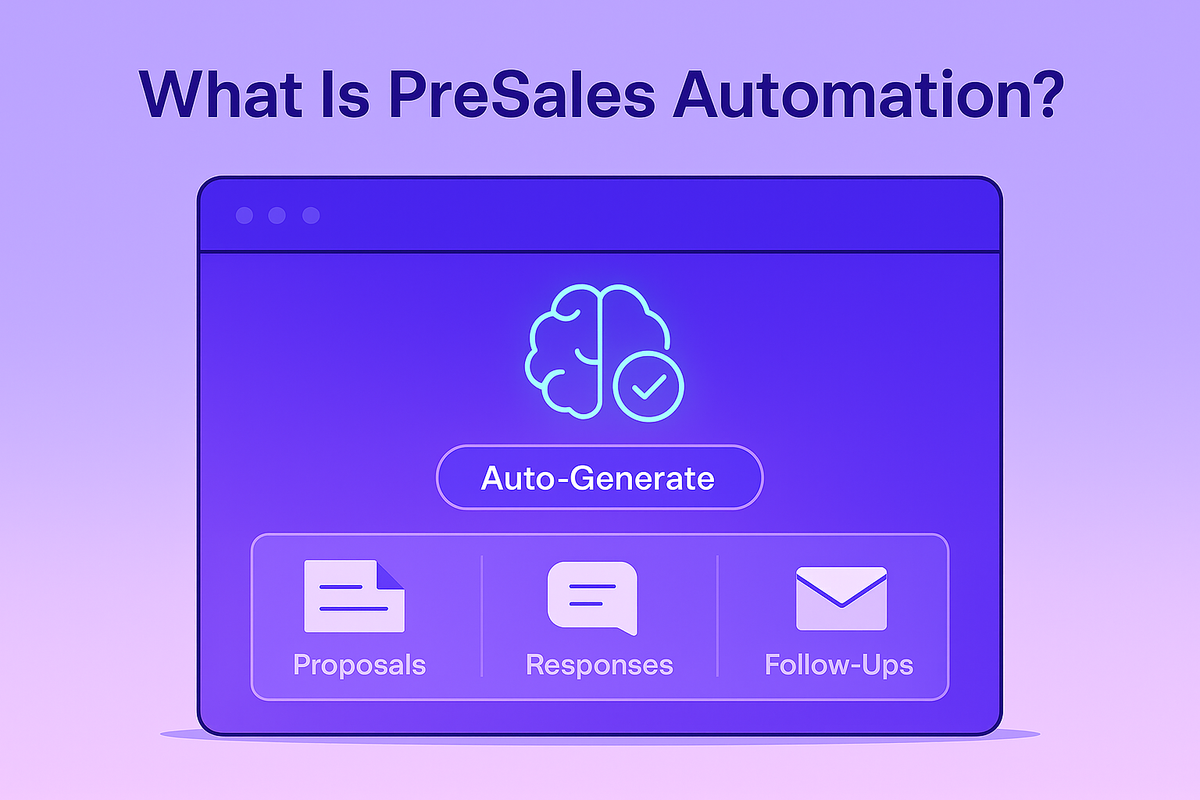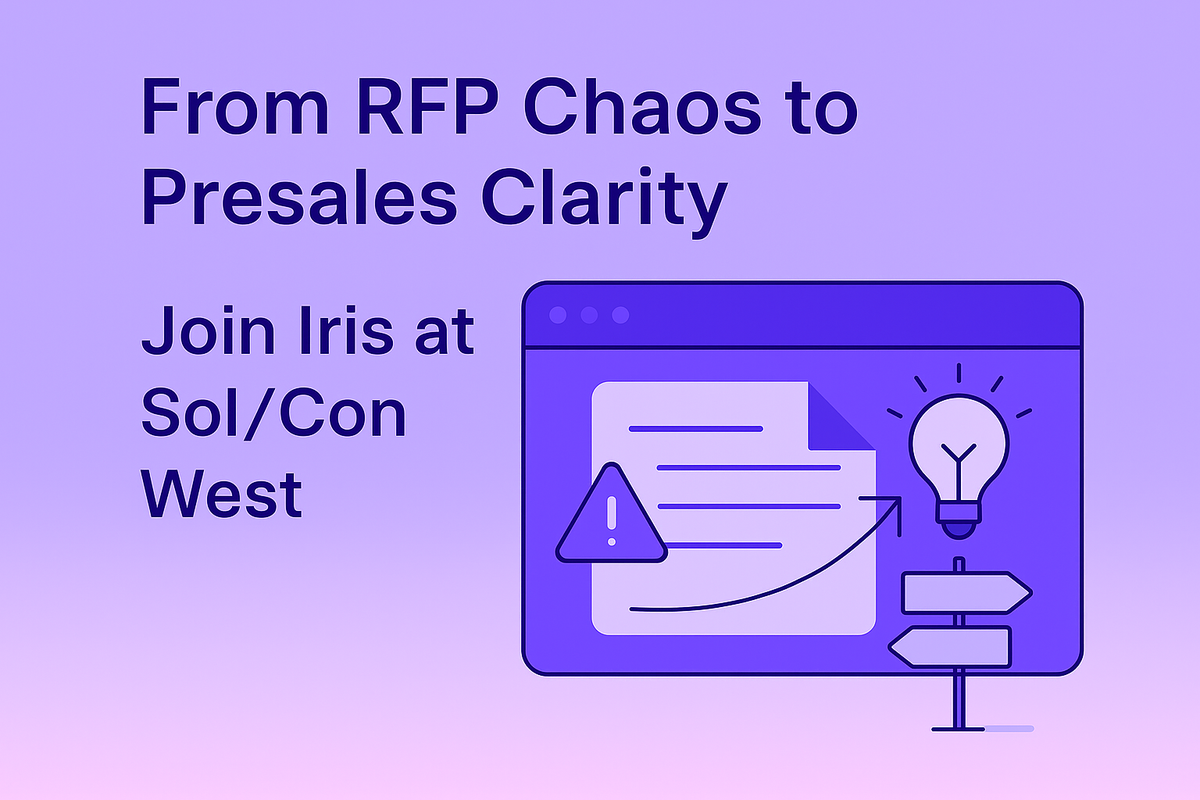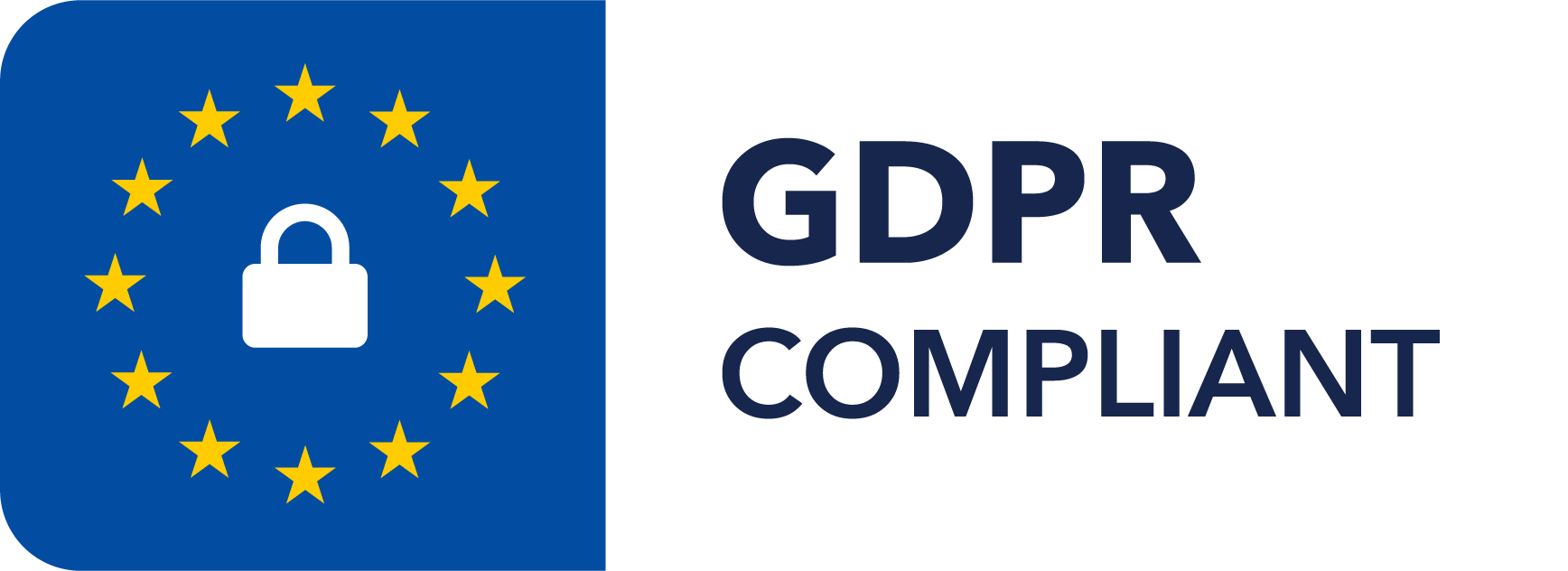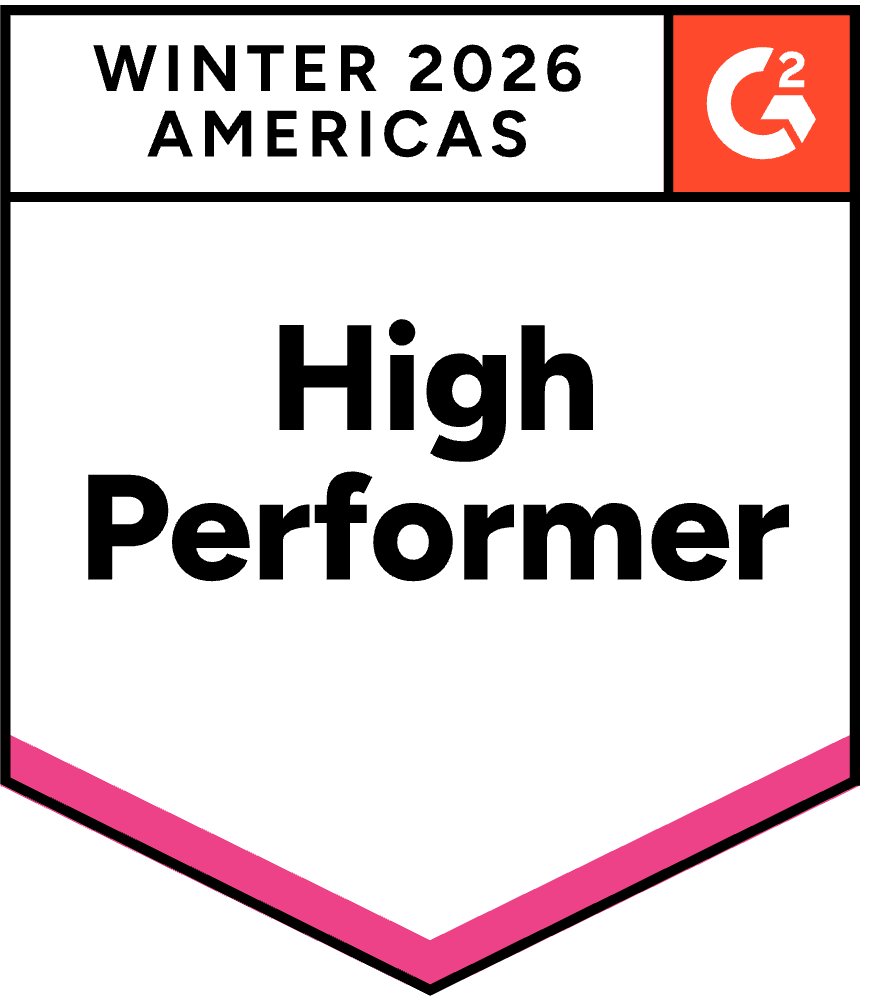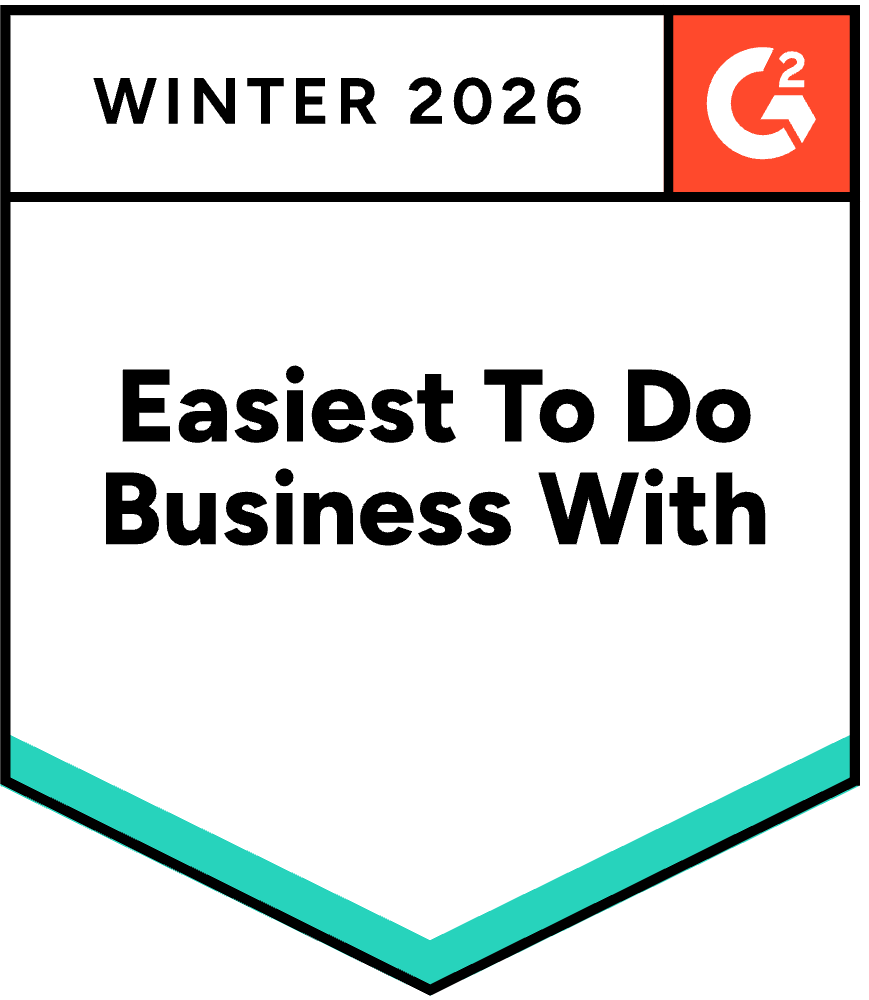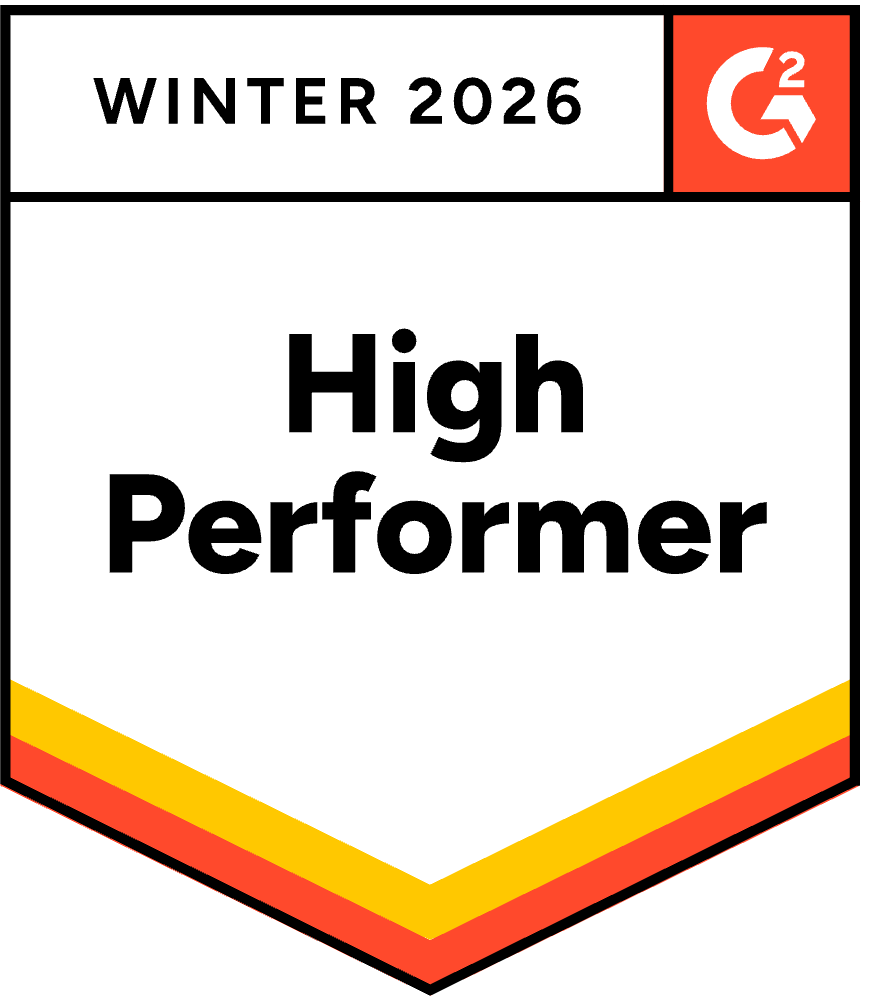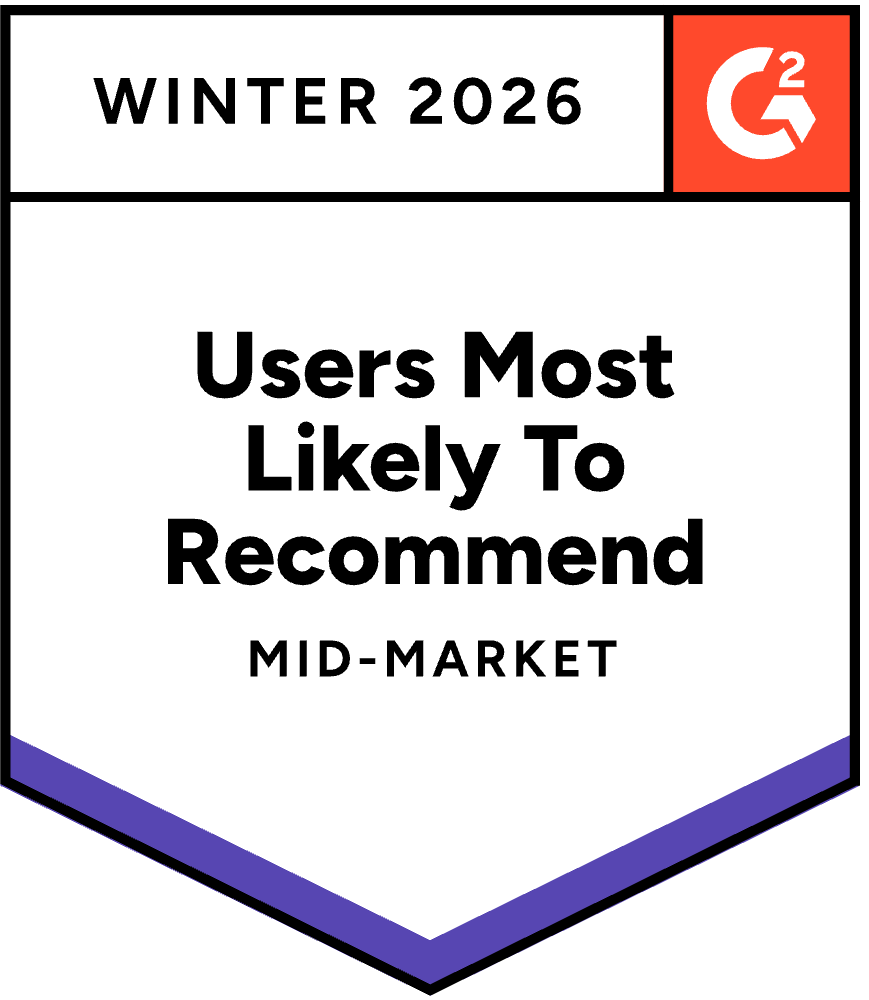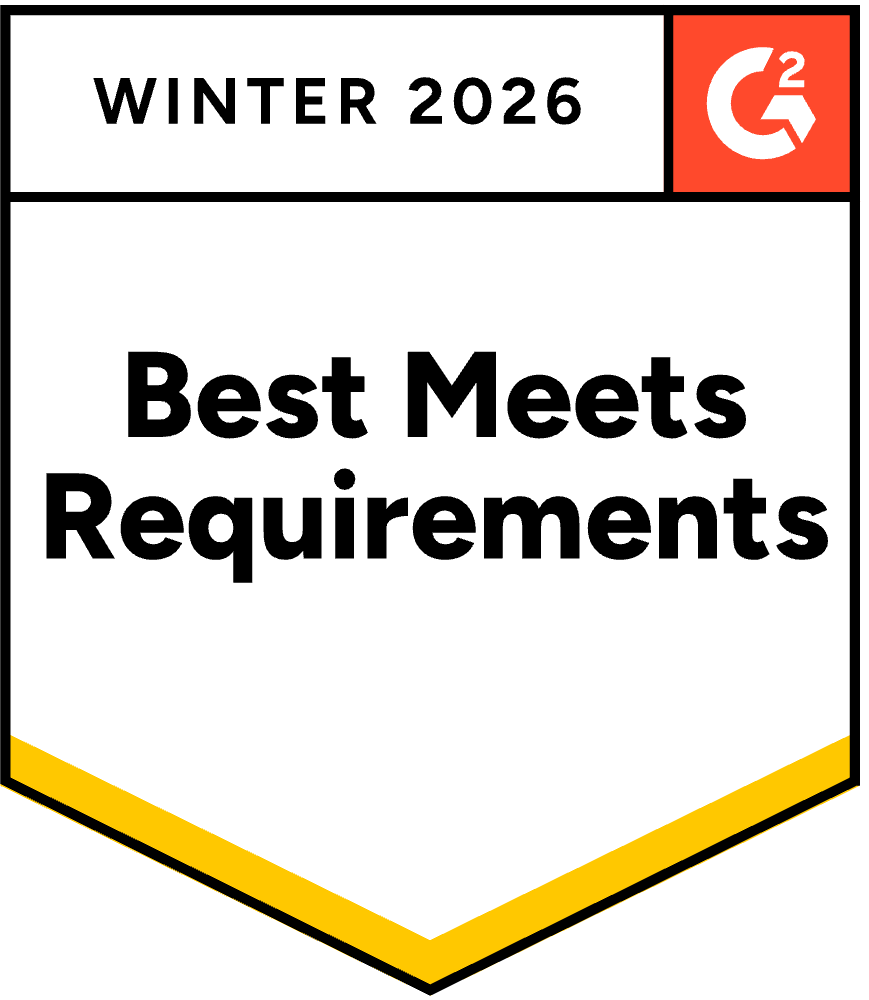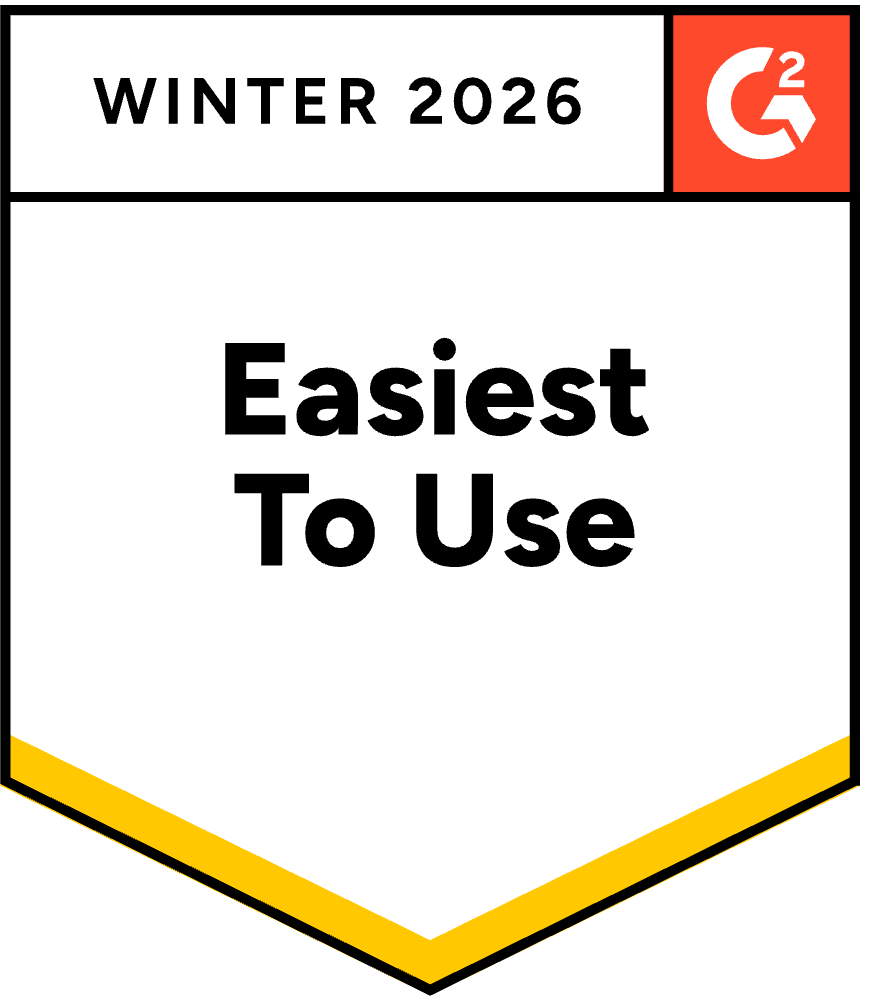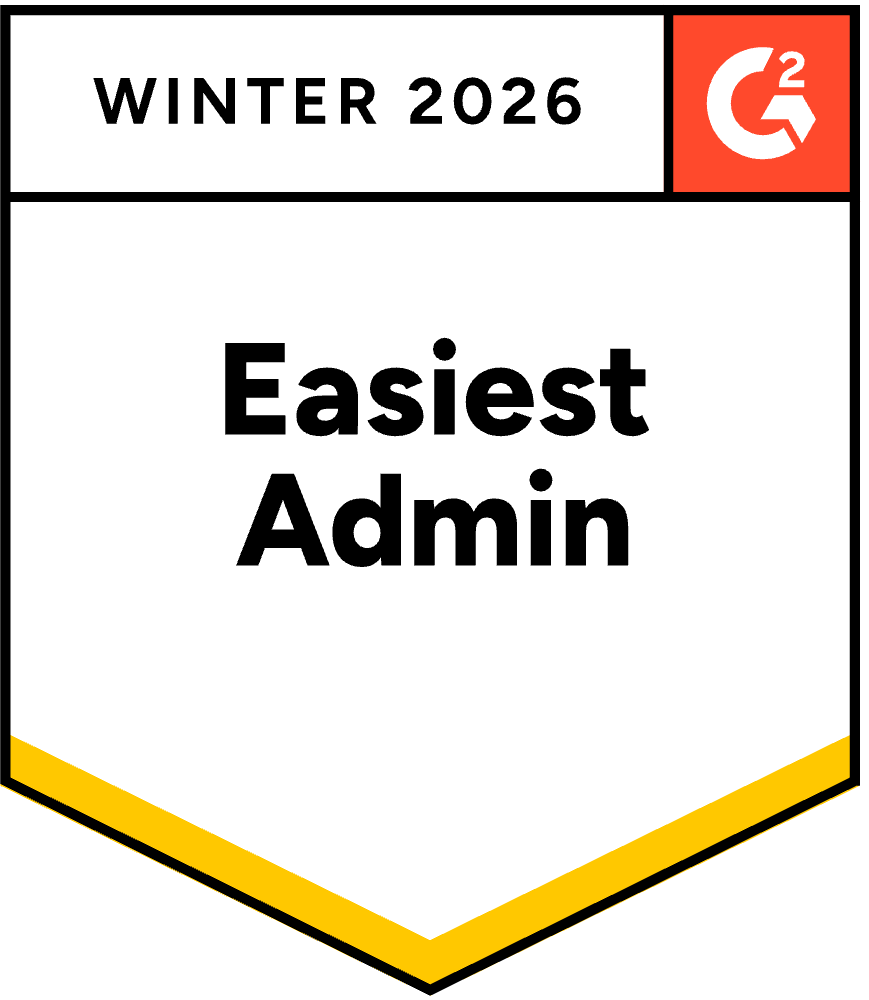AI for GovCon: How It Changes the RFP Game
February 26, 2025
By
Evie Secilmis

Responding to government RFPs can feel like a constant race against the clock. You're digging through past proposals, triple-checking compliance requirements, and trying to meet impossible deadlines. This is where AI for GovCon completely changes the game. By using government proposal AI tools like Iris, you can automate the most time-consuming tasks. This reduces response time, minimizes human error, and frees your team to focus on strategy and relationship-building—the things that actually win contracts.
Government agencies are increasingly turning to AI to improve procurement efficiency, making it imperative for contractors to adopt automated proposal generation to remain competitive. AI solutions like Iris centralize knowledge, analyze past responses, and suggest optimized content, ensuring that every submission is polished and compliant.
How AI for GovCon Changes the RFP Game
1. Find and Qualify the Right Opportunities
Before your team can even write a winning proposal, you have to find the right opportunity. The government procurement landscape is massive, and manually sifting through contracts can feel like a full-time job in itself. AI tools cut through the noise by streamlining this initial discovery phase, helping you focus your energy on bids you have a real shot at winning. Instead of spending hours scouring dozens of websites, these platforms act as your personal scout, bringing qualified leads directly to you and providing the data needed to make a smart call.
Automated Contract and Grant Sourcing
Imagine an AI that scans more than 40,000 sources—from federal portals to state-level sites—every day to find contracts that perfectly match your company’s profile. That’s exactly what modern platforms can do. Tools designed for government contractors deliver daily alerts with tailored opportunities, effectively automating the search process. This means your team can stop the endless hunt for RFPs and spend more time on high-value activities like strategy and building relationships with key agency contacts.
Informed Go/No-Go Decisions
Deciding whether to pursue a bid is one of the most critical choices your team will make. A wrong move can waste hundreds of hours and significant resources on a proposal that was never going to win. AI helps you make this go/no-go decision with confidence by analyzing key data points. It can review past awards for similar projects, assess the complexity of the requirements, and even evaluate the competitive landscape. This data-driven insight ensures you’re only pursuing contracts where you have a strong advantage, which is a smarter way to improve your win rate.
2. Analyze Complex Documents in Minutes
Once you’ve identified a promising RFP, the next hurdle is understanding it. Government RFPs are notoriously long and complex, often running hundreds of pages filled with dense legal and technical language. Manually dissecting these documents is not only slow but also leaves room for human error. AI transforms this process from a multi-day task into a matter of minutes, breaking down the document into manageable parts and ensuring your team doesn’t miss a single critical detail.
Break Down and "Chat" with RFPs
Instead of just reading a static, 200-page PDF, modern AI tools allow you to have a conversation with it. You can upload a massive RFP document and ask it direct questions in plain language, like, "What are the key security requirements?" or "Summarize the evaluation criteria." This ability to "chat" with your documents helps your team find the exact information they need without getting bogged down in jargon, which accelerates comprehension and gets the response process started much faster.
Generate Compliance Checklists Automatically
In government contracting, compliance isn't just important—it's everything. A single missed requirement can get your entire proposal disqualified. AI ensures nothing falls through the cracks by automatically generating detailed compliance checklists directly from the RFP. An AI deal desk solution like Iris can even score how well your planned response aligns with the contract’s rules, flagging any potential gaps before you start writing. This automated oversight not only saves time but also dramatically reduces the risk of a technical disqualification.
1. Faster RFP Responses
Manual proposal writing consumes valuable time. AI in proposal management eliminates repetitive tasks by auto-filling sections, surfacing relevant content, and adapting to evolving requirements, allowing teams to submit faster and more compelling proposals.
2. Improved Accuracy and Compliance
Mistakes in proposals can lead to disqualification. AI-driven RFP solutions help ensure responses meet compliance standards by cross-referencing key requirements and suggesting improvements, minimizing the risk of oversight.
AI-Powered Pre-Submission Reviews
Even after days of work, hitting “submit” on a proposal can feel like a leap of faith. AI-driven RFP solutions like Iris act as your final quality control checkpoint, giving your team a crucial second look before the deadline. The platform can scan your completed document against the original RFP, scoring how well you’ve met every requirement and flagging potential gaps or inconsistencies. This isn't just a spell check; it’s a comprehensive analysis to ensure every response is compliant and aligned with the agency's stated needs. This final review catches overlooked details and provides the confidence that your proposal is not just complete, but compelling and correct.
3. Enhanced Collaboration Across Teams
GovCon projects involve multiple stakeholders. AI facilitates seamless collaboration by maintaining a centralized repository of responses, integrating with internal knowledge bases, and enabling real-time edits, ensuring consistency across proposals.
Centralized Bid and Project Management
Keeping track of every moving part in a government bid can feel like a full-time job in itself. When your team is working from different documents and spreadsheets, it's easy for tasks to fall through the cracks and for outdated information to slip into the final proposal. An AI-powered platform acts as your central command center. It organizes all your opportunities, lets you assign tasks to team members, and provides a clear view of your progress. Instead of hunting for files or asking for status updates, everyone can see what needs to be done and when, all in one place. This level of organization not only streamlines your workflow but also ensures everyone is working with the most current and accurate information, which is crucial for building a winning bid.
4. Better Proposal Quality with AI-Powered Insights
AI-powered proposal writing tools analyze past proposal success rates, industry trends, and best practices to suggest optimized content. This ensures that responses are tailored for maximum impact, increasing win rates.
5. Cost and Resource Efficiency
By automating repetitive tasks, AI allows teams to focus on strategic aspects of proposal writing. This not only cuts operational costs but also enhances team productivity, making efficiency in government proposals a reality.
Strategic Advantages of Using AI in Government Contracting
Beyond speeding up your response time, integrating AI into your government contracting workflow offers some serious strategic advantages. It’s not just about doing the same things faster; it’s about doing them smarter. The right AI platform can connect you with new partners and give you the leverage to compete on a larger scale, regardless of your team's size. These tools are changing how businesses approach government bids by providing resources that were once only available to the largest players. This shift allows you to focus less on the administrative grind and more on building winning strategies and relationships that lead to long-term success.
Find Teaming Partners and Subcontractors
Winning a government contract often means you can’t go it alone. Finding the right teaming partners or subcontractors is crucial, but searching for them can feel like looking for a needle in a haystack. This is where AI can be a game-changer. Some GovCon AI platforms have access to enormous databases, with information on hundreds of thousands of companies. Instead of spending weeks manually vetting potential partners, you can use AI to quickly identify contractors with the specific capabilities, experience, and credentials you need. This allows you to build stronger, more competitive teams for joint ventures and subcontracting opportunities, giving your proposal a significant edge.
Level the Playing Field for Smaller Businesses
Let’s be honest: smaller businesses often feel like they’re at a disadvantage when competing against large corporations with entire departments dedicated to proposal writing. AI helps to close that gap. By automating the time-consuming parts of the RFP response process, AI-powered tools empower smaller teams to accomplish more with fewer resources. You can generate accurate, compliant, and compelling proposals in a fraction of the time it would take manually. This newfound efficiency means you can respond to bids with tight deadlines and compete confidently against larger companies, turning your small team into a lean, agile, and formidable competitor in the government marketplace.
Key Considerations for GovCon AI Platforms
Jumping into the world of AI for government contracting is exciting, but it's important to remember that not all platforms are built the same. The stakes are incredibly high when you're dealing with sensitive proposal data and strict government regulations. Before you commit to a solution, you need to do your homework. The right platform will not only streamline your workflow but also protect your information with ironclad security. Key areas to examine include the platform's security protocols, data privacy policies, and deployment flexibility. Equally important are the practical aspects, like transparent pricing and the quality of customer support you can expect to receive.
Security, Privacy, and Deployment
When you're handling sensitive information for government proposals, security isn't just a feature—it's a fundamental requirement. Your data's integrity and confidentiality are non-negotiable. A breach could not only cost you a contract but also damage your reputation beyond repair. That's why it's critical to scrutinize an AI platform's security infrastructure, its commitment to data privacy, and its ability to adapt to your organization's specific IT environment. These factors will determine whether a tool is a trusted asset or a potential liability in your GovCon toolkit.
Government-Grade Security and Compliance
When evaluating an AI platform, look for concrete proof of its security chops. You should see certifications like SOC 2 TYPE 2 and options for CUI compliance. The platform should be built on FedRAMP-compliant systems and use government-level encryption, such as AES-256, to protect your data both in transit and at rest. These aren't just buzzwords; they are essential standards that ensure your information is protected against unauthorized access. A platform that prioritizes these measures demonstrates a serious commitment to keeping your most sensitive proposal data safe.
Data Privacy Policies
One of the biggest questions surrounding AI is what happens to your data. A critical feature to look for is a strict data privacy policy that guarantees your information will never be used to train the provider's AI models. This ensures that your proprietary strategies, client details, and proposal content remain completely confidential and are never exposed to other users or third parties. Your data is your competitive advantage, and the AI platform you choose should be designed to protect it, not learn from it. Always confirm this policy before uploading any sensitive documents.
Flexible Deployment Options
Every organization has unique IT and security requirements, especially in the government contracting space. A one-size-fits-all approach to software deployment rarely works. The best AI platforms offer flexible options to meet your specific needs. This could mean a secure cloud-based solution on a trusted provider like Microsoft Azure, an on-premise installation on your own company's network for maximum control, or even deployment on portable hardware for air-gapped environments. This flexibility ensures you can integrate powerful AI capabilities without compromising your existing security protocols or operational workflows.
Cost, Accessibility, and Support
Beyond the technical specifications, the practical aspects of an AI platform are just as important for long-term success. A powerful tool is only useful if it fits your budget, is easy for your team to adopt, and comes with reliable help when you need it. Hidden fees, a steep learning curve, or non-existent customer service can quickly turn a promising investment into a frustrating expense. That's why it's essential to look for transparent pricing models, opportunities to test the software, and a support team that has your back.
Transparent Pricing and Free Trials
No one likes surprise fees. Look for AI providers that offer clear, transparent pricing, whether it's a monthly or annual subscription. This allows you to budget effectively and understand the total cost of ownership from the start. Even better, many top-tier platforms offer a free trial period. This is an invaluable opportunity to get your hands on the software, test its features with your team, and see how it fits into your existing workflow before making a financial commitment. A free trial shows that the company is confident in its product and gives you the chance to be, too.
Responsive Customer Support
When you're on a tight deadline for a must-win proposal, the last thing you need is to be stuck with a technical issue and no one to call. Excellent customer support is a critical, yet often overlooked, feature. Look for platforms that promise quick response times—ideally under 24 hours—and have high customer satisfaction rates. A dedicated and responsive support team ensures that any questions or issues are resolved quickly, minimizing downtime and keeping your proposal process moving forward smoothly. This level of support can make all the difference in high-pressure situations.
Why Choose Iris for GovCon AI?
Iris is at the forefront of GovCon AI tools, offering a seamless proposal automation experience tailored for government contractors. With a focus on streamlining RFP responses, Iris provides:
- Smart content recommendations based on past proposals and best practices.
- Real-time compliance checks to prevent costly errors.
- A centralized knowledge hub for effortless collaboration.
- Integration with existing workflows, ensuring a smooth transition to AI-powered efficiency.
Government contracting is evolving, and staying ahead means leveraging AI-driven RFP solutions that enhance productivity and precision. With Iris, project managers can transform their RFP workflows, optimize resources, and secure more government contracts with confidence.
Get Started with AI for Government Contracting
The future of government contracting automation is here, and AI is leading the way. RFP automation isn’t just a competitive advantage—it’s a necessity for efficiency, accuracy, and scalability. As agencies adopt AI-driven procurement processes, contractors must embrace AI-powered proposal writing to keep pace.
With Iris, GovCon professionals can revolutionize their approach to proposal management, ensuring faster, more accurate, and higher-quality responses that drive success in the government contracting space.
Frequently Asked Questions
My proposal data is highly sensitive. How can I be sure an AI platform will keep it secure? This is one of the most important questions you can ask. A trustworthy AI platform built for government contracting will prioritize security above all else. Look for solutions that offer government-grade security measures, such as SOC 2 TYPE 2 certification and FedRAMP-compliant infrastructure. Your data should be protected with advanced encryption, and the provider must have a strict privacy policy that guarantees your information is never used to train their AI models.
Is an AI tool like this really practical for a small business, or is it just for large contractors? AI is a powerful tool for small businesses looking to compete with larger corporations. It automates the most time-consuming parts of the proposal process, from finding opportunities to ensuring compliance. This allows a small, agile team to respond to more RFPs with higher quality and accuracy, without needing a massive proposal department. It effectively multiplies your team's efforts, letting you focus your limited resources on strategy instead of administrative tasks.
How difficult is it to get my team started with an AI proposal tool? The best platforms are designed to be intuitive and fit right into your existing workflow. While any new tool has a learning curve, a good provider will offer a free trial so you can test it out firsthand. They should also provide responsive customer support to guide you through setup and answer any questions that come up. The goal is to make your life easier, so the onboarding process should be straightforward and well-supported.
Do I have to start from scratch, or can I use my company's existing proposal content? You absolutely don't have to start from scratch. A key feature of these AI platforms is their ability to act as a centralized knowledge base. You can upload your past proposals, whitepapers, and other relevant documents. The AI then learns from your best, approved content, making it easy to find and reuse accurate information for new proposals. This ensures consistency and saves you from constantly reinventing the wheel.
Why do I need a specialized GovCon AI tool? Can't I just use a general AI chatbot? While general AI chatbots are impressive, they aren't built to handle the specific complexities of government RFPs. A specialized GovCon tool offers features that a general AI can't, like automatically generating detailed compliance checklists from a 200-page document or analyzing past awards to inform your go/no-go decisions. These platforms are fine-tuned for the unique language, formats, and high stakes of government contracting, providing a level of precision and security you won't find elsewhere.
Key Takeaways
- Automate the entire proposal lifecycle, not just the writing: AI tools handle the most time-consuming tasks, from finding the right government opportunities and analyzing complex RFPs to generating instant compliance checklists.
- Gain a strategic edge in a competitive market: AI levels the playing field by enabling smaller teams to compete with larger firms and helps you quickly identify qualified teaming partners to build stronger, more compelling bids.
- Make security a non-negotiable requirement: Before choosing a platform, confirm it has government-grade security certifications (like SOC 2) and a strict data privacy policy that prevents your information from being used to train its AI models.
Related Articles
Share this post
Link copied!



